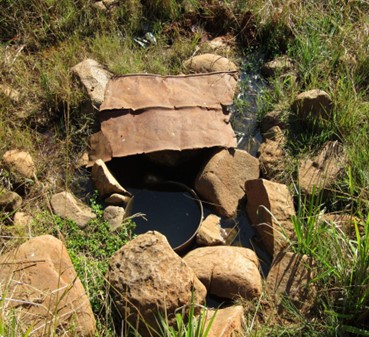Spring management in groundwater dependent rural communities
The research outcomes of the Spring 4 Life (uMthombo wempilo) project – funded by the Water Research Commission (WRC) – have now been published in a policy brief. Recommendations and key messages about improving the quality and availability of groundwater resources for communities that depend on it are succinctly captured.
The Council for Scientific and Industrial Research (CSIR) contributed to the crucial research study that focused on promoting the adaptive capacity of rural communities to climate change. The research focused on groundwater use in rural South Africa. CSIR senior researcher Dr Phumza Ntshotsho collaborated with stakeholders to understand the capacity and ability of rural communities dependent on groundwater to adapt to the impacts of climate change on spring water supply.
The research focused on assessing the condition of commonly used springs in two selected study areas, the uMzimvubu River and Thukela River catchments. By making use of a holistic approach to catchment management, the study drew linkages between ecosystems and human livelihoods, with the recognition that groundwater is not only being threatened by the impacts of climate change but also affected by factors such as population growth and land use change patterns in rural communities.
The collaborative research study by Ezemvelo KZN Wildlife, the CSIR, the University of KwaZulu-Natal, the South African National Biodiversity Institute and the Department of Agriculture, Land Reform and Rural Development relied heavily on learning-based engagements with key stakeholders to identify pressures on springs and co-develop context-specific solutions for water insecurity in the two catchments. Using a mixed methodology approach, the multidisciplinary team generated valuable data on spring attributes such as location, type, condition, and how many households depend on springs for water supply. This will inform proactive decision-making about the communities’ ability to adapt to the effects of climate change on groundwater.
Many people across the country rely on groundwater as a source of water supply. Rural communities’ dependence on groundwater sources is heightened by the challenges municipalities face across South Africa that lack the revenue base and capacity to service the water needs of these communities. “Considering the substantial backlogs in the roll-out of bulk water infrastructure to many rural communities, it is imperative that municipalities and Catchment Management Agencies formalize rural groundwater governance through incorporating spring protection plans into municipal Integrated Development Plans and Catchment Management Plans. Additionally, in the context of rural communities, it is important for governance mechanisms to be inclusive of traditional leaders, who are the custodians of the land,” states Ntshotsho.

right of every South African citizen to have access to sufficient water,
some rural dwellers’ only source of water is unprotected natural springs
that are vulnerable to multiple sources of pollution.
More information on the policy brief
Loza, L; Chueu, K; Cindi, D; Gola, N.P.; Mubangizi, BC and Ntshotsho, P. 2023. Promoting the adaptive capacity of rural communities to climate change through holistic catchment management: a case study of groundwater dependent communities in two catchments. WRC Project Number C2021/22-00618.
Contact Person: Dr Phumza Ntshotsho, @email,